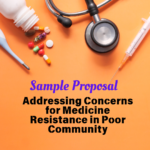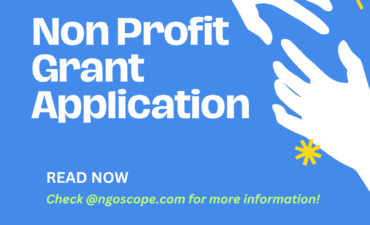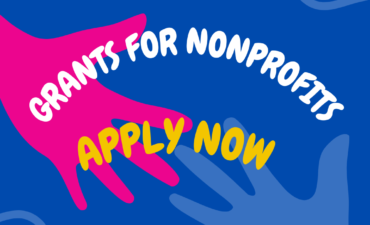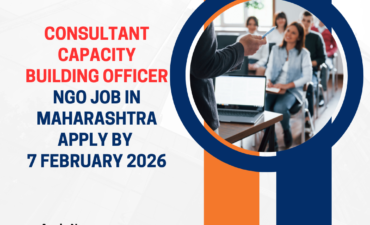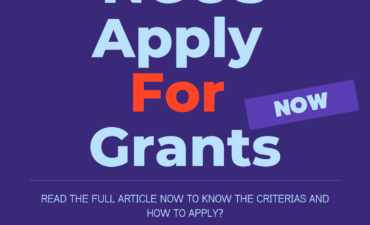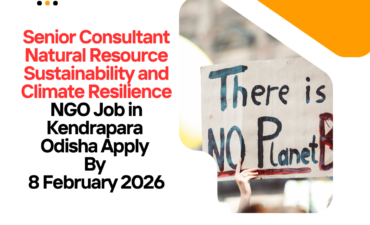Executive Summary: Sample Proposal for NGOs addressing concerns for Medicine Resistance in Poor Community, In the wake of escalating crisis of medicine resistance, particularly pronounced in economically disadvantaged communities, demands urgent and coordinated intervention. This executive summary outlines our NGO’s strategic initiative aimed at mitigating the impact of medicine resistance through a multifaceted approach. Our mission is to ensure equitable access to effective healthcare solutions, promote responsible medication usage, and empower communities with knowledge to combat the spread of resistant strains.
Driven by the alarming rise in medicine-resistant infections, our project focuses on three core objectives: enhancing access to quality medicines, fostering responsible prescribing practices among healthcare providers, and implementing robust community education programs. By collaborating closely with local healthcare facilities, governmental bodies, and international health organizations, we aim to deploy targeted interventions that not only address the immediate challenges but also build long-term resilience against the evolving threat of medicine resistance.
Our strategy encompasses a series of interconnected activities, including capacity-building workshops for healthcare professionals, community outreach initiatives to raise awareness about the prudent use of antibiotics, and advocacy efforts to influence policy and regulatory frameworks. Furthermore, we recognize the importance of sustainable supply chains and accurate diagnostic tools in combating medicine resistance, and thus, our approach integrates procurement support and investment in diagnostic capabilities.
This executive summary serves as a succinct overview of our comprehensive plan to tackle medicine resistance in poor communities. By leveraging evidence-based practices and fostering collaborative partnerships, we are committed to making a tangible difference in the lives of those most affected by this global health challenge.
Introduction: Sample Proposal for NGOs addressing concerns for Medicine Resistance in Poor Community, The burgeoning crisis of medicine resistance, particularly in economically disadvantaged communities, presents a formidable challenge to global health. This phenomenon, characterized by the diminished effectiveness of drugs due to the evolution and spread of resistant microorganisms, threatens the foundational pillars of modern medicine. From routine surgeries to the treatment of common infections, the implications of medicine resistance are profound and far-reaching, affecting not only human health but also animal health and food security.
In poor communities, the impact of medicine resistance is exacerbated by a confluence of factors including limited access to quality healthcare services, inadequate sanitation and hygiene, and the overuse and misuse of antimicrobials. These conditions create an environment conducive to the rapid emergence and spread of drug-resistant pathogens. Moreover, the economic burden of medicine resistance is significant, leading to increased healthcare costs and prolonged hospital stays, which disproportionately affect low-income households and strain already fragile health systems.
Neglected Tropical Diseases (NTDs), which predominantly afflict vulnerable and marginalized populations, further illustrate the gravity of the situation. Resistance to medicines used to treat NTDs, such as leprosy and human African trypanosomiasis, underscores the urgent need for concerted efforts to monitor resistance, enhance drug efficacy, and bolster the development of second-line treatments.
The World Health Organization (WHO) recognizes Antimicrobial Resistance (AMR) as one of the top global public health and development threats, estimating that bacterial AMR was directly responsible for 1.27 million global deaths in 2019. The misuse and overuse of antimicrobials across various sectors, including human, animal, and plant health, are identified as primary drivers of this growing problem. The economic repercussions, are equally alarming, with projections indicating potential trillion-dollar impacts on healthcare that impacts global GDP by 2050.
Addressing the multifaceted challenge of medicine resistance in poor communities necessitates a comprehensive and integrated approach. This includes improving access to quality and affordable medicines, promoting responsible prescribing practices, strengthening diagnostic capabilities, and raising awareness through community education. Additionally, fostering collaboration between healthcare providers, governments, and international organizations is crucial for implementing effective policies and interventions that can mitigate the spread of drug-resistant infections and safeguard the health of the most vulnerable populations.
Problem Statement (Sample Proposal for NGOs addressing concerns for Medicine Resistance in Poor Community)
Medicine resistance, a growing global health concern, refers to the ability of microorganisms (such as bacteria, viruses, fungi, and parasites) to resist the effects of drugs, such as antibiotics, antivirals, antimalarials, anthelmintics, and antifungals, that were originally effective in treating infections caused by them. This phenomenon arises primarily due to the overuse and misuse of antimicrobial drugs in human and veterinary medicine, as well as in agriculture, leading to the selection and spread of resistant strains.
In economically disadvantaged communities, the impact of medicine resistance is particularly devastating. Limited access to healthcare services, coupled with high rates of infectious diseases, creates a fertile ground for the emergence and spread of drug-resistant infections. Moreover, the lack of affordable and quality-assured medicines exacerbates the situation, forcing individuals to resort to substandard or counterfeit drugs, which further contributes to resistance.
The severity of medicine resistance is underscored by alarming statistics. According to the World Health Organization (WHO), in 2019, antimicrobial resistance accounted for nearly 5 million deaths worldwide, with the highest mortality rates observed in sub-Saharan Africa. Specifically, drug-resistant tuberculosis (TB) remains a significant concern, with an estimated 465,000 new cases of rifampicin-resistant TB reported globally in 2019. Additionally, resistance to artemisinin-based combination therapies, the frontline treatment for malaria, has been detected in several countries, threatening global efforts to eliminate this disease.
In our target community, situated in a low-income region, the prevalence of medicine resistance is particularly high due to a combination of factors including poor sanitation, limited access to clean water, and inadequate healthcare infrastructure. Local health facilities often lack the necessary diagnostic tools to identify resistant strains accurately, leading to incorrect prescriptions and further fueling the cycle of resistance. Furthermore, the economic impact on families is substantial, with increased medical expenses and loss of income due to prolonged illness.
Addressing medicine resistance in this context requires a multifaceted approach that not only targets the immediate healthcare needs but also addresses the underlying social and economic determinants of health. This includes improving access to quality healthcare services, promoting rational use of antimicrobials, enhancing diagnostic capabilities, and implementing effective surveillance systems to monitor resistance patterns. Additionally, community education and engagement are crucial to raising awareness about the prudent use of antibiotics and the importance of completing prescribed treatments.
Project Rationale/Justification (Sample Proposal for NGOs addressing concerns for Medicine Resistance in Poor Community)
The urgency to address medicine resistance, particularly in economically disadvantaged communities, stems from its escalating threat to global health and the dire consequences it poses for individual well-being and societal progress. Medicine resistance undermines the effectiveness of treatments for common infections, thereby increasing morbidity and mortality rates, especially among vulnerable populations. The World Health Organization (WHO) has identified antimicrobial resistance (AMR) as one of the top ten global public health threats facing humanity, highlighting the critical need for immediate action.
Addressing medicine resistance is not just about preserving the efficacy of current antibiotics; it’s also about safeguarding future generations’ ability to combat infectious diseases effectively. Without concerted efforts to curb the overuse and misuse of antimicrobials, we risk entering a post-antibiotic era where minor injuries and common infections could once again become deadly. This scenario would reverse decades of progress in healthcare, impacting not only human health but also food security and economic stability.
The connection between the project goals and the broader mission of our NGO is rooted in our commitment to advancing health equity and improving the quality of life for underserved populations. By tackling medicine resistance, we aim to ensure that everyone, regardless of their socio-economic status, has access to effective treatments for infectious diseases. Our project aligns with our NGO’s mission by focusing on three core areas:
- Enhancing Access to Quality Medicines: We strive to ensure that communities have access to affordable, quality-assured medicines, thereby reducing the reliance on substandard or counterfeit drugs that contribute to resistance.
- Promoting Rational Use of Antimicrobials: Through education and training initiatives, we aim to foster responsible prescribing practices among healthcare providers and prudent use of antibiotics among the general public.
- Strengthening Healthcare Systems: By investing in diagnostic capabilities and surveillance systems, we seek to build resilient healthcare infrastructures capable of detecting and responding to medicine resistance effectively.
Our project is justified by the immediate need to mitigate the spread of drug-resistant infections and the long-term goal of creating sustainable solutions that prevent the emergence of new resistant strains. By addressing medicine resistance, our NGO contributes to the global fight against AMR, aligning with international health priorities such as the Sustainable Development Goals (SDGs) and the Global Action Plan on AMR. This initiative not only reflects our organizational values but also positions us at the forefront of efforts to secure a healthier future for all.
Project Goals and Objectives (Sample Proposal for NGOs addressing concerns for Medicine Resistance in Poor Community)
Goals
Short-Term Goal: To significantly reduce the prevalence of medicine resistance within the target community over the next two years through targeted interventions aimed at improving access to quality medicines, promoting rational antimicrobial use, and enhancing diagnostic capabilities.
Long-Term Goal: To establish sustainable systems and practices that prevent the emergence and spread of drug-resistant infections, thereby safeguarding the health and well-being of the community over the next decade and beyond.
Objectives
- Improve Access to Quality Medicines:
- Secure partnerships with pharmaceutical companies and international donors to ensure a consistent supply of affordable, quality-assured antibiotics and other essential medicines.
- Implement a robust procurement and distribution system to facilitate the availability of these medicines across healthcare facilities serving the target community.
- Promote Rational Use of Antimicrobials:
- Develop and disseminate evidence-based guidelines for antibiotic prescribing among healthcare providers.
- Conduct regular training sessions for healthcare professionals on the principles of antibiotic stewardship and responsible prescribing practices.
- Launch community education campaigns to raise awareness about the dangers of antibiotic misuse and the importance of completing prescribed treatments.
- Enhance Diagnostic Capabilities:
- Upgrade healthcare facilities with modern diagnostic equipment capable of accurately identifying resistant strains of bacteria and other pathogens.
- Train laboratory technicians and healthcare workers on the use of advanced diagnostic tools and interpretation of test results.
- Establish a surveillance system to monitor patterns of medicine resistance and inform treatment protocols.
- Strengthen Healthcare Systems:
- Collaborate with local health authorities to integrate medicine resistance management strategies into broader healthcare policies and plans.
- Support the development of healthcare infrastructure, including laboratories and pharmacies, to ensure they meet standards for managing medicine resistance effectively.
- Advocate for policy changes that promote prudent antimicrobial use and penalize practices contributing to resistance.
By achieving these objectives, our project aims to significantly reduce the burden of medicine resistance in the target community, leading to improved health outcomes, reduced mortality rates from infectious diseases, and enhanced quality of life for community members. Furthermore, these efforts will contribute to global health security by mitigating the spread of drug-resistant infections beyond the local context.
Strategies and Activities (Sample Proposal for NGOs addressing concerns for Medicine Resistance in Poor Community)
To effectively address medicine resistance in the target community, our project employs a comprehensive set of strategies and activities designed to engage multiple stakeholders and leverage existing resources efficiently. These strategies are grounded in evidence-based practices and aim to foster sustainable changes in behavior and policy.
Educational Campaigns
- Community Awareness Programs: Launch mass media campaigns using local radio, television, and social media platforms to disseminate messages about the dangers of antibiotic misuse and the importance of completing prescribed treatments. These campaigns will feature testimonials from community members and healthcare professionals to personalize the message and increase impact.
- School-Based Education: Implement educational programs in schools to teach children about the proper use of antibiotics, the concept of medicine resistance, and the importance of hygiene in preventing infections. This initiative aims to instill responsible health behaviors at an early age.
Training for Healthcare Professionals
- Antibiotic Stewardship Workshops: Organize workshops for healthcare providers focusing on antibiotic stewardship principles, including rational prescribing practices and the latest guidelines for treating common infections. These sessions will also address the management of patients with drug-resistant infections.
- Diagnostic Training: Provide training sessions for laboratory technicians on the use of advanced diagnostic tools for identifying resistant pathogens. This will enable healthcare facilities to make informed treatment decisions based on accurate diagnoses.
Community Engagement Strategies
- Community Health Fairs: Host health fairs offering free health screenings, consultations, and educational materials on medicine resistance. These events will serve as platforms for engaging community members in discussions about health and promoting healthy behaviors.
- Peer Educator Programs: Train local volunteers as peer educators who can disseminate information about medicine resistance and promote responsible antibiotic use within their communities. Peer educators will play a crucial role in reaching out to vulnerable populations.
Partnerships
- Local Governments: Collaborate with local health departments to integrate medicine resistance management strategies into public health policies. This partnership will facilitate the allocation of resources and ensure policy alignment across healthcare facilities.
- Healthcare Facilities: Establish partnerships with hospitals and clinics to implement training programs for staff and to upgrade diagnostic capabilities. These collaborations will also focus on improving procurement processes to ensure access to quality medicines.
- Other NGOs: Forge alliances with other NGOs working on health-related issues to leverage collective expertise and resources. Joint initiatives may include advocacy efforts, research projects, and community outreach programs.
By implementing these strategies and activities, our project aims to create a multifaceted approach to combating medicine resistance. Through education, training, and community engagement, coupled with strategic partnerships, we seek to foster a culture of responsible antimicrobial use and strengthen healthcare systems against the threat of drug-resistant infections.
Expected Results (Sample Proposal for NGOs addressing concerns for Medicine Resistance in Poor Community)
Anticipated Outcomes
Our project aims to significantly reduce the incidence of medicine resistance and improve community health through a comprehensive approach that includes educational campaigns, training for healthcare professionals, and community engagement strategies. The anticipated outcomes of the project are as follows:
- Reduced Incidence of Drug-Resistant Infections: By promoting the rational use of antimicrobials and improving access to quality medicines, we expect to see a decrease in the prevalence of drug-resistant infections within the target community.
- Improved Treatment Outcomes: Enhanced diagnostic capabilities and adherence to treatment guidelines will lead to more effective management of infectious diseases, resulting in shorter recovery times and lower mortality rates.
- Increased Community Awareness: Through educational campaigns, we anticipate a significant rise in community members’ knowledge about the importance of antibiotic stewardship and the role they play in preventing medicine resistance.
Sample Proposal for NGOs addressing concerns for Medicine Resistance in Poor Community
Indicators for Measuring Success
To evaluate the success and progress of our project, we will utilize a mix of quantitative and qualitative indicators that align with the SMART criteria (Specific, Measurable, Achievable, Relevant, and Time-bound):
- Reduction in Prevalence of Drug-Resistance: Monitor the incidence of drug-resistant infections within the target community over time. A decline in infection rates will indicate the effectiveness of our interventions.
- Improvement in Treatment Outcomes: Track patient recovery times and mortality rates for common infections treated with antibiotics. Reductions in these metrics will signify more effective treatment approaches.
- Knowledge and Behavior Change: Assess changes in community knowledge about antibiotic use and resistance through surveys and interviews. Additionally, observe changes in behavior, such as increased adherence to prescribed treatments and decreased self-medication.
- Healthcare Provider Adherence to Guidelines: Measure the percentage of healthcare providers prescribing antibiotics according to established guidelines. An increase in adherence rates will reflect the impact of training programs.
- Access to Quality Medicines: Evaluate the availability and affordability of quality-assured antibiotics in the target area. Improved access will be indicated by increased stock levels in healthcare facilities and lower prices for consumers.
- Community Engagement Metrics: Track participation rates in educational campaigns and health fairs, as well as feedback from community members about the relevance and effectiveness of these initiatives.
By systematically monitoring these indicators, we can gauge the project’s progress towards its objectives and make adjustments as necessary to maximize its impact on reducing medicine resistance and improving community health.
Budget Summary (Sample Proposal for NGOs addressing concerns for Medicine Resistance in Poor Community)
Below is a simplified budget breakdown for the project, including dummy amounts for illustrative purposes. This table provides a structured view of the projected costs associated with various components of the project.
| Category | Description | Estimated Cost |
| Personnel | Salaries for project coordinators, trainers, and field staff. | $100,000 |
| Materials | Educational materials, posters, brochures, and other printables for campaigns. | $20,000 |
| Training Programs | Costs associated with organizing workshops, seminars, and training sessions for healthcare providers and community members. | $30,000 |
| Administrative Expenses | Office supplies, utilities, rent, and other overhead costs. | $15,000 |
| Travel and Logistics | Transportation, accommodation, and per diem for project team during travel for training and campaign activities. | $10,000 |
| Equipment and Infrastructure | Purchase or rental of diagnostic equipment, computers, and other necessary hardware. | $50,000 |
| Supplies and Medicines | Procurement of essential medicines and supplies for healthcare facilities. | $60,000 |
| Community Engagement | Costs related to organizing health fairs, community meetings, and other engagement activities. | $25,000 |
| Monitoring and Evaluation | Expenses for tracking project progress and assessing outcomes, including software and consultant fees. | $20,000 |
| Contingency Fund | Reserve fund to cover unexpected expenses or emergencies. | $10,000 |
| Total Estimated Cost | $330,000 |
This budget provides a rough estimate of the financial requirements for the project. It’s important to note that actual costs may vary based on unforeseen circumstances, inflation, and changes in project scope. Regular reviews and adjustments to the budget will be necessary throughout the project lifecycle to ensure optimal resource utilization and compliance with financial targets.
Sustainability Plan (Sample Proposal for NGOs addressing concerns for Medicine Resistance in Poor Community)
Ensuring the long-term impact of our project beyond the initial funding period is crucial for maintaining the gains made in combating medicine resistance and improving community health. Our sustainability plan incorporates strategies focused on local capacity building, knowledge transfer, and ongoing engagement with stakeholders.
Strategies for Long-Term Impact
- Sustainable Funding Mechanisms: Explore and establish sustainable funding streams, such as grants from international organizations, donations from private entities, and partnerships with corporations interested in health promotion. This ensures continuous support for essential activities even after the project’s formal end.
- Local Government and Institutional Partnerships: Strengthen relationships with local health departments and other relevant institutions to integrate our project’s findings and methodologies into their ongoing programs. This institutionalization of practices promotes sustainability by embedding our work within existing structures.
- Community-Led Initiatives: Encourage the formation of community-led groups focused on health promotion and resistance management. Providing these groups with training and resources empowers them to continue advocating for responsible antimicrobial use and organizing health awareness campaigns independently.
- Technology Transfer: Introduce and train local healthcare providers and community members on the use of digital health tools, such as telemedicine platforms and mobile applications for tracking resistance patterns and promoting health literacy. These technologies can sustain learning and engagement beyond the project’s lifespan.
Plans for Local Capacity Building and Knowledge Transfer
- Training Workshops: Continue conducting training workshops for healthcare professionals and community leaders on antibiotic stewardship, diagnostic techniques, and health promotion strategies. These workshops will equip participants with the skills to maintain and expand upon the project’s achievements.
- Mentorship Programs: Establish mentorship programs pairing experienced healthcare professionals with newer practitioners and community health workers. This reciprocal learning model fosters knowledge sharing and builds a network of experts dedicated to combating medicine resistance.
- Resource Sharing Agreements: Set up agreements with local universities and research institutions for the exchange of research findings, best practices, and educational materials. This collaboration facilitates the continuous improvement of health promotion strategies and the adaptation of new technologies.
- Continuous Monitoring and Evaluation: Implement a system for ongoing monitoring and evaluation of medicine resistance trends and the effectiveness of interventions. This data-driven approach allows for timely adjustments to strategies and ensures that efforts remain aligned with changing needs and contexts.
By focusing on these strategies and plans, our project aims to create a lasting legacy in the fight against medicine resistance. Through capacity building, knowledge transfer, and sustained engagement with local communities and institutions, we seek to ensure that the benefits of our project endure long after the funding period concludes.
Monitoring and Evaluation Plan (Sample Proposal for NGOs addressing concerns for Medicine Resistance in Poor Community)
The M&E plan is designed to provide a systematic framework for tracking the project’s progress and evaluating its outcomes. It encompasses the collection, analysis, and dissemination of data to inform decision-making, improve programmatic effectiveness, and demonstrate accountability to donors and stakeholders.
Monitoring Project Progress
- Activity Monitoring: Regularly review the execution of planned activities, including training sessions, educational campaigns, and community engagements. This involves checking off completed tasks against the project schedule and ensuring that all activities are carried out as intended.
- Financial Tracking: Maintain a detailed record of all expenditures against the allocated budget. This includes monitoring the use of funds for personnel, materials, training programs, and administrative expenses to ensure fiscal responsibility.
- Stakeholder Engagement: Document interactions with healthcare providers, community members, and partner organizations. This includes recording feedback received and actions taken in response to stakeholder inputs.
Evaluating Outcomes
- Quantitative Outcomes: Collect and analyze data on key outcome indicators, such as reductions in the incidence of drug-resistant infections, improvements in treatment outcomes, and increases in community knowledge about antibiotic use. This data will be collected through surveys, health records, and laboratory tests.
- Qualitative Outcomes: Gather qualitative data through interviews, focus group discussions, and case studies to understand the experiences and perceptions of project beneficiaries and stakeholders. This will provide insights into the effectiveness of the project from a grassroots level.
- Impact Assessment: Conduct impact assessments to evaluate the long-term effects of the project on medicine resistance levels and community health. This will involve comparing pre-project and post-project data to measure the project’s contribution to these outcomes.
Reporting and Accountability
- Regular Reporting: Produce quarterly and annual reports detailing the project’s progress, outcomes, challenges encountered, and lessons learned. These reports will be transparent and accessible to all stakeholders, including donors and the community.
- Feedback Mechanism: Establish a mechanism for receiving and acting upon feedback from stakeholders. This will involve setting up channels for stakeholders to submit their views and concerns, which will then be addressed by the project team.
- Transparency and Accountability: Comply with all reporting requirements set forth by donors and adhere to ethical standards in the collection and use of data. Any deviations from the project plan will be documented and explained in the reporting process.
Implementation
The M&E plan will be implemented by a dedicated M&E team composed of project staff with expertise in data collection, analysis, and reporting. This team will work closely with the project coordinator and other stakeholders to ensure that the M&E activities are aligned with the project’s objectives and contribute to its overall success.
By adhering to this M&E plan, the project commits to rigorous monitoring and evaluation of its activities and outcomes, ensuring accountability to donors and stakeholders and providing valuable insights for future health initiatives.
Sample Proposal for NGOs addressing concerns for Medicine Resistance in Poor Community
In conclusion, the proposed project stands as a pivotal initiative aimed at combating the growing menace of medicine resistance, a challenge that threatens the very foundation of modern healthcare. By leveraging a comprehensive approach that combines educational campaigns, targeted training for healthcare professionals, and strategic community engagement, this project seeks to turn the tide against the spread of drug-resistant infections.
The significance of this endeavor extends beyond the immediate reduction in infection rates; it represents a broader commitment to safeguarding public health and ensuring equitable access to effective medical care. Through meticulous planning, a robust monitoring and evaluation framework, and a steadfast commitment to transparency and accountability, we are poised to make a tangible impact on the health outcomes of our community.
Moreover, the project’s sustainability plan underscores our dedication to fostering local capacity and ensuring the longevity of our efforts. By empowering local communities and healthcare providers with the knowledge and tools necessary to maintain momentum, we lay the groundwork for a sustainable future where medicine resistance is no longer a prevailing threat.
As we move forward, we invite all stakeholders—donors, partners, and the community—to join us in this critical endeavor. Together, we can forge a path towards a healthier tomorrow, where the promise of effective antibiotics remains unbroken and accessible to all. Thank you for considering this proposal, and we look forward to the opportunity to make a meaningful difference in the fight against medicine resistance.
Related Good Reads, Link
Hey, STEAL our Best Premium Content For Absolutely Free, Check Out the Links below
HOPE these will add value to your existing skills and knowledge
Our information bears no cost (it’s absolutely FREE), don’t let valuable information slip away.
Join our community of avid readers who are always in the know. Subscribe to our website; stay connected and engaged with the latest news, trends, and developments by subscribing today.
(PUSH the bell ICON)
Leverage the power of knowledge to propel your organization to new heights. Don’t miss out to explore our content
- Latest Funds for NGOs,
- NGO Jobs
- Resources (Helpful Guides and Courses)
- Premium Resources
- NGO related articles
Empowering Humanity through Funds, Resources and Collective Action
Sharing is Appreciated

